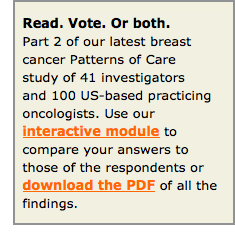

 My first audio interview with HER2 legend Dr Dennis Slamon was during the 2002 ASCO meeting, and not surprisingly the conversation started off with an extensive discussion of his “baby” — BCIRG 006, the only major adjuvant trastuzumab (T) trial evaluating a nonanthracycline T regimen (TCH — docetaxel, carboplatin, T). At that time, Dr Slamon was perhaps the most outspoken champion of the biology of anti-HER2 therapy, and I was particularly interested in learning about his treatment decisions outside a clinical trial setting. Right up until the landmark trials were first presented at ASCO 2005 our Patterns of Care studies showed virtually no clinical investigators (CIs) or practicing oncologists (POs) using adjuvant T even in the most extreme cases (eg, a 35-year-old patient with 3 positive nodes). Dr Slamon, however, was unafraid of treading in controversial waters and unabashedly commented that he was using adjuvant T somewhat routinely. Knowing this was going out on a national CME program, I was already a bit uneasy and then was further shocked when Dr Slamon discussed a young lifelong marathon runner with a 1.7-cm node-negative tumor to whom he administered TCH off study because the patient feared the 2 anthracycline-containing arms of 006 might impact her well-conditioned myocardium and thus her running.
My first audio interview with HER2 legend Dr Dennis Slamon was during the 2002 ASCO meeting, and not surprisingly the conversation started off with an extensive discussion of his “baby” — BCIRG 006, the only major adjuvant trastuzumab (T) trial evaluating a nonanthracycline T regimen (TCH — docetaxel, carboplatin, T). At that time, Dr Slamon was perhaps the most outspoken champion of the biology of anti-HER2 therapy, and I was particularly interested in learning about his treatment decisions outside a clinical trial setting. Right up until the landmark trials were first presented at ASCO 2005 our Patterns of Care studies showed virtually no clinical investigators (CIs) or practicing oncologists (POs) using adjuvant T even in the most extreme cases (eg, a 35-year-old patient with 3 positive nodes). Dr Slamon, however, was unafraid of treading in controversial waters and unabashedly commented that he was using adjuvant T somewhat routinely. Knowing this was going out on a national CME program, I was already a bit uneasy and then was further shocked when Dr Slamon discussed a young lifelong marathon runner with a 1.7-cm node-negative tumor to whom he administered TCH off study because the patient feared the 2 anthracycline-containing arms of 006 might impact her well-conditioned myocardium and thus her running.
In this second part of our latest Patterns of Care initiative we revisit nonprotocol management strategies for patients with HER2-positive breast cancer in the adjuvant and metastatic settings a decade after this memorable chat. It will be interesting to look back on these findings next year and document treatment patterns with new anti-HER2 approaches, including subcutaneous T, pertuzumab and maybe even T-DM1, but for now here is a summary of where we are:
1. There is far from a consensus on the choice of chemo partner for adjuvant T.
When presented with the case of a 60-year-old patient with 1 positive node, 49% of CIs and 52% of POs opt for Dr Slamon’s TCH regimen with most others favoring the inclusion of an anthracycline. Not surprisingly, the use of anthracyclines decreases for a 75-year-old patient, and some oncologists use the Dana-Farber paclitaxel/T regimen for these individuals. On the other hand, in the neoadjuvant setting investigators are more likely (65%) to use an anthracycline (AC![]() TH or the “Buzdar regimen”). Maybe even more important will be the pending results of the ALTTO and BETH trials evaluating the role (if any) of lapatinib and bevacizumab in the adjuvant setting.
TH or the “Buzdar regimen”). Maybe even more important will be the pending results of the ALTTO and BETH trials evaluating the role (if any) of lapatinib and bevacizumab in the adjuvant setting.
2. Chemo/T has become standard for patients with all but the smallest HER2-positive, node-negative tumors.
What was almost medical heresy in 2002 has become standard 10 years later, and currently all but 1 of the 41 CIs and about 90% of POs use chemo/T for a 60-year-old patient with a 0.8-cm node-negative tumor. When the same patient’s age is adjusted to 75, most respondents still treat. Adjuvant T monotherapy continues to be infrequently employed.
3. For patients with relapse 2 years after adjuvant T most oncologists restart T rather than go to lapatinib. This trend persists with earlier relapse.
Dr Slamon's 2002 interview also got into the clinical concept of prolonged anti-HER2 treatment in select patients, and even in those prelapatinib days he caused further controversy and again predicted the future by noting that for patients with metastatic disease progression on chemo/T he generally switched the chemo and continued T for at least 1 course. The strategy of restarting T at first relapse documented in this survey dovetails with the recently presented and published CLEOPATRA study that demonstrated an impressive benefit to adding the HER2 dimerization-inhibiting antibody pertuzumab to chemo/T at first relapse.
4. Only 71 of 100 POs are aware of T-DM1 (trastuzumab/maytansine).
It’s always challenging for clinicians to decide how much attention to pay to novel agents that are not yet approved, but this surprising finding is almost certain to change dramatically in a few weeks when Dr Kim Blackwell leads off the ASCO plenary session with data from the Phase III EMILIA trial comparing T-DM1 to capecitabine/lapatinib in patients with metastatic disease who have received prior T-based therapy. While we have already seen a press release letting us know that the trial met its primary endpoint in favor of T-DM1, once the formal results are unveiled in Chicago oncologists will need to quickly get up to speed because it seems as if this novel and well-tolerated antibody-drug conjugate is the real thing.
Next… the final segment of Patterns of Care, the great challenge of patients with metastatic HER2-negative disease.
Neil Love, MD
Research To Practice
Miami, Florida